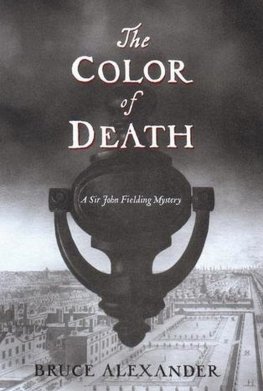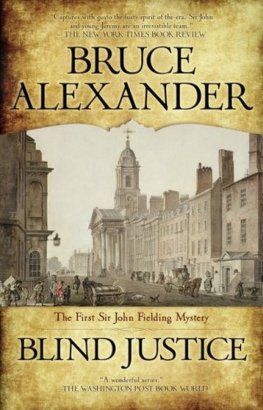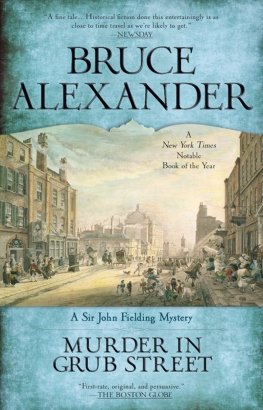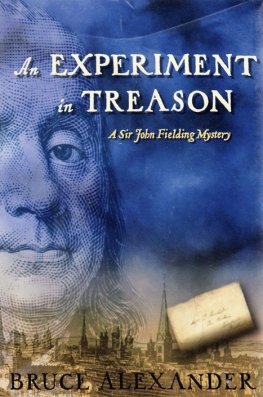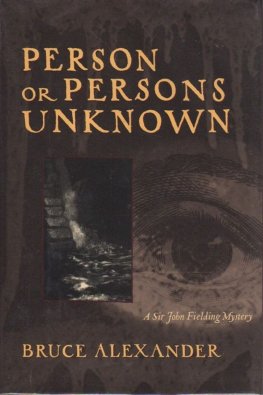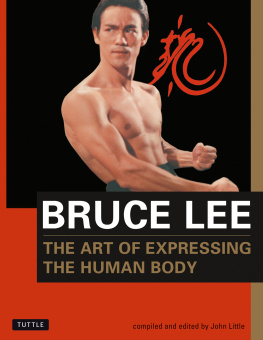Bruce Alexander - The Color of Death
Here you can read online Bruce Alexander - The Color of Death full text of the book (entire story) in english for free. Download pdf and epub, get meaning, cover and reviews about this ebook. year: 2001, publisher: Berkley, genre: Detective and thriller. Description of the work, (preface) as well as reviews are available. Best literature library LitArk.com created for fans of good reading and offers a wide selection of genres:
Romance novel
Science fiction
Adventure
Detective
Science
History
Home and family
Prose
Art
Politics
Computer
Non-fiction
Religion
Business
Children
Humor
Choose a favorite category and find really read worthwhile books. Enjoy immersion in the world of imagination, feel the emotions of the characters or learn something new for yourself, make an fascinating discovery.
- Book:The Color of Death
- Author:
- Publisher:Berkley
- Genre:
- Year:2001
- ISBN:9780425182031
- Rating:3 / 5
- Favourites:Add to favourites
- Your mark:
- 60
- 1
- 2
- 3
- 4
- 5
The Color of Death: summary, description and annotation
We offer to read an annotation, description, summary or preface (depends on what the author of the book "The Color of Death" wrote himself). If you haven't found the necessary information about the book — write in the comments, we will try to find it.
The Color of Death — read online for free the complete book (whole text) full work
Below is the text of the book, divided by pages. System saving the place of the last page read, allows you to conveniently read the book "The Color of Death" online for free, without having to search again every time where you left off. Put a bookmark, and you can go to the page where you finished reading at any time.
Font size:
Interval:
Bookmark:
Bruce Alexander
The Color of Death
ONE
By the end of that day in 1772, a concatenation of events would have begun which would alter considerably the circumstances of life there at Number 4 Bow Street. We had no notion of that, however, as we sat together like a proper family at breakfast. Annie, the cook, had baked a fresh loaf, and we ate it warm with rashers of bacon and lumps of good country butter. The mood was festive. It was seldom, after all, that the five of us were together at the table so early in the day. More frequently, we came one by one, ate what was conveniently at hand, and headed off along our separate paths. On that morning, however, Lady Fielding was to attend a meeting of the board of the Magdalene Home for Penitent Prostitutes, a charitable enterprise which she herself had brought into being. Her preparations for this event had lasted well past the usual hour of her departure for the Magdalene Home. Nevertheless, there was then time for her to converse with Sir John; to give the days orders to Annie and me; and to tease her secretary, Clarissa, the orphan who Sir John had taken on as his ward that she might be saved from the Lichfield poor house.
Rising, she took one last gulp of tea and waved to me to show that she was ready to leave. It was my task, reader, to precede her down the stairs to the street in order to make sure that a hackney coach would be waiting at our door for her. And so I proceeded. Just as I left the kitchen, however, I heard Clarissa ask what she was to do during the rest of the day.
Lady Fielding did then reply: Why, the duchess will have luncheon following the meeting, you may be sure of it, and who knows what will follow that! In short, I may be gone the entire day, and so you may spend it as you like. It is yours, my dear Clarissa.
I heard no more, but what I had caught thus far was quite enough, thank you. I knew full well that though given the days freedom, Clarissa would be expected to enjoy it in my care. At thirteen, she was considered by Lady Fielding far too young to walk the streets of London, even in the daylight hours.
And so it proved to be. Returning, I was hailed by Sir John and asked to sit down. I reluctantly took a place beside him, fearing the worst.
You saw Lady Fielding off in a hackney?
Oh, I did, sir.
But she gave you no specific idea of the time she might return?
No sir, Im not at all sure that she knows, Sir John.
He sighed. Probably not.
I had the feeling that he was temporizing, simply marking time until he found the opportunity to address a topic he would as soon not discuss.
I wish there were a way she could inform us when she was ready to return. Then I might send you to fetch her back. He paused. I wondered if he wished some comment from me. But no, he pressed onward: Simply put, I wish that the streets were safer.
Yet, I objected, Mr. Bailey and all the constables have made all but a few corners quite safe at night.
Thats just it, you see, Jeremy. I suspect that in some quarters it has become riskier by day than at night. Robberies in daylight have become a particular problem. I have included in the new budget a request for two extra constables. If Im refused, then I fear I shall have to transfer two of the night men forward to days.
Is it truly so bad, Sir John?
Bad enough, said he, that I must ask you to watch over Clarissa on this, her day of liberty.
Ah, there it was, thought I. And I could not but admire how skillfully he had maneuvered me to the point where his request seemed both reasonable and necessary. Well, no doubt it was. That, however, did not persuade me to like better the task of playing nursemaid to one who seemed by nature discourteous, cantankerous, and more generally disagreeable than anyone else in my circle of acquaintance. That she was intelligent and clever I would not dispute. Nevertheless, her intelligence and cleverness seemed most often to be used to prove me wrong and embarrass me.
Your silence tells me that you are less than delighted by my request.
Though blind he may have been, Sir John saw more with his other four senses than I could with my own keen eyes. How could he learn so much from a moments pause, a mere hitch in time?
Sir John Fielding had been magistrate of the Bow Street Court for near twenty years and had gained a reputation among Covent Garden greengrocers as a fair and just arbitrator of their disputes; even criminals of the district seemed to think him evenhanded. So I could hardly say that I was then surprised when he undertook to set things right with me. I believe that in effect he wished to persuade me now to volunteer for the task for which I had just been drafted. He would do this by convincing me that what in any case had to be done was just and noble and at the same time quite generous of me.
You know, said he in a quiet, reasoning tone, she thinks quite highly of you. You seem to be something of a model to her.
Clarissa? Surely not, sir!
Indeed its true, Jeremy. She greatly admires the single-minded way that you have applied yourself to the study of law.
Oh? said I, making a question of it as I considered the claim. I knew that Sir John would not lie regarding such a matter, and so I accepted it that Clarissa had praised me. But even better was it to realize that she could only have formed her opinion from what she had heard from him. He must first have spoken well of me.
Now, I admit that she is a willful girl, said he (which did surprise me somewhat). She will express her opinion on every matter and argue beyond reason that hers is the right one. Yet, I believe you might teach her to be different.
But sir, I protested, I have tried and often. I reason with her, and it does little good.
Put in another way, you argue with her. You attempt to correct her, to point out her errors. Is that not so?
Well yes.
Then leave off that in the future. Try teaching not by precept but by example. Behave toward her as you would have her behave toward others. You must try to be an elder brother to her.
An elder brother? I echoed his words in what, I fear, was a rather dubious manner.
Why yes, said Sir John. Should that be so difficult to imagine?
Perhaps not if I apply myself to the task.
Thus, it came about that not much more than half an hour later, Clarissa Roundtree and I, Jeremy Proctor, both of us dressed in our best, were on our way to call upon Samuel Johnson. When Clarissa learned that sometime that day I was to deliver a letter to that distinguished personage (actually no more than an invitation in the form of a note, which I had penned for Sir John the day before), she immediately forsook any plans she may have had and asked if she might accompany me. Indeed she asked so politely that I wondered if perhaps Sir John had not had a few words with her as he had with me. Whether or not this were so I never discovered.
If I seemed especially hostile to Clarissa at this time, when earlier we two had apparently reached a reconciliation of sorts, it was because she had only recently dismayed and angered me with what I must admit was not much more than a prank. Ever since she had come to stay at Number 4 Bow Street she had been in close company with Lady Fielding companion and secretary to her. I have permitted myself the use of upside-down commas, for I had always been dubious as to the nature and extent of the secretarial help which she provided.
It must have been considerable, however, for Lady Fielding declared she had no notion of how she had managed earlier without her; in particular she praised her skill as an organizer. Further proof had come on a Sunday not long before when, with nobody about below on the main floor, Clarissa took it upon herself to alter thoroughly the filing system which Mr. Marsden, the court clerk, used. (It should be made clear that though he may have used the system, he did not invent it; his predecessor, Mr. Brogden, had done that.) Next day there was no little confusion as the court clerk attempted to fathom what had been done, yet when Clarissa confessed and explained the principle upon which she had reorganized the files (names, and not dates alone), Mr. Marsden declared her system superior and applauded her efforts.
Font size:
Interval:
Bookmark:
Similar books «The Color of Death»
Look at similar books to The Color of Death. We have selected literature similar in name and meaning in the hope of providing readers with more options to find new, interesting, not yet read works.
Discussion, reviews of the book The Color of Death and just readers' own opinions. Leave your comments, write what you think about the work, its meaning or the main characters. Specify what exactly you liked and what you didn't like, and why you think so.

